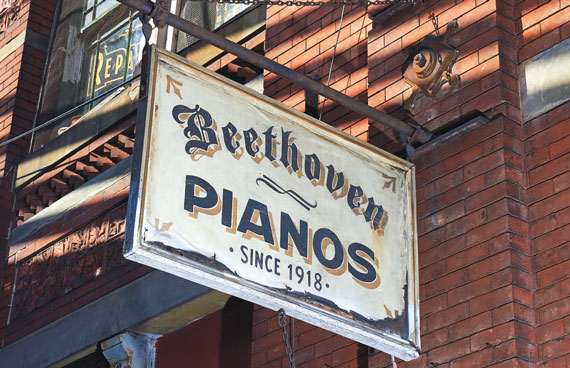 With real estate heating up in the Bronx, it’s no surprise that some developers have started playing the name game.
With real estate heating up in the Bronx, it’s no surprise that some developers have started playing the name game.
New developments or renewed interest in a particular area tends to open the acronym floodgates in New York City: Neighborhood names are shortened to sing-song geography lessons or completely recreated. The phenomenon is one that has played out time and time again, giving rise to a litany of Frankenstein portmanteaus: ProCro (a merging of Prospect Heights and Crown Heights), NoMa (North of Manhattan), GoCaGa (Gowanus and Carroll Gardens) and SoHa (South of Harlem), just to name a few.
The latest attempt in the Bronx is a hat-tip to the borough’s piano-making history. Developer Keith Rubenstein has offered up “The Piano District” for a section of Mott Haven which, according to the city’s Landmarks Preservation Commission, was home to as many as 60 piano factories in the early 19th century. Rubenstein’s Somerset Properties and the Chetrit Group plan to build up to six 25-story apartment towers on Third and Lincoln avenues. The developers recently commissioned a giant billboard ad under the Third Avenue Bridge that reintroduces the South Bronx as the Piano District and offers up “luxury waterfront living, world-class dining, fashion, art + architecture” as coming attractions in the neighborhood. Rubenstein said he’s not seeking to replace the neighborhood’s current name, he just wants to supplement it by designating a section bounded by Willis Avenue to Third Avenue and the East River to 138th Street under a different pseudonym.
“I think it’s going to catch on because it’s descriptive, it’s short and it kind of is something that was already there and lends itself to the future,” Rubenstein said. “I’m not just calling it a made-up name for no reason whatsoever.”
Borough historian Lloyd Ultan said developers have been naming neighborhoods in the Bronx for centuries and had a tendency to name them after themselves. That was the case with Jordan L. Mott and Gouverneur Morris Jr., who are credited with creating Mott Haven and Port Morris. Other names didn’t have the same longevity. Woodstock, a neighborhood in the South Bronx during the mid-19th century, flamed out after about a decade, although the Woodstock branch library is a nod to its existence. Orloff Park, which was a subdivision of Kingsbridge created in the 1860s, also didn’t last.
There’s no exact science to which names stick. Some designations, like the Meatpacking District, Tribeca, the Financial District and Soho — the latter considered New York City’s premier portmanteau — seem to catch on because they’re grounded either in history or a geographical cue.
But developers, of course, are often motivated by dollars and cents. Renaming a neighborhood, Ultan said, is primarily a marketing tactic championed to appeal to certain buyers and renters. “They’re doing it basically because they believe that the name they apply would be good for sales,” he said.
He then added: “But there is something to say that by renaming or rebranding, you are cutting off the people from their historical heritage.”
Not surprisingly, there has been resistance to rebranding efforts in some neighborhoods. Some Riverdale residents objected to a 2011 attempt to turn the leafy and historic enclave into NoMa. At the time, the label sprang from Arc Companies’ new condominium Solaria. Joseph Korff, principal of Arc, said pushback against the nickname was minimal. He said the name only set out to introduce the neighborhood to people unfamiliar with the area.
“There’s nothing sacred in ‘Riverdale’ or any particular borough,” he said. “It’s a communication device. People, particularly the younger set, or people who moved into the city, had no sense of the neighborhood. With the trendy, the hip, the whatever, NoMa helps.”
Halstead Property brokers Shebrelle Hunter-Green and Adrian Thompkins, who largely focus on the Bronx, said that nicknames can help foster a sense of community. “I think once a neighborhood is named, the neighborhood starts to conform to this idea,” Thompkins said.
But when asked about “SoBro,” a nickname for the South Bronx that’s emerged over the last decade or so, both drew the line. Clients, they said, haven’t yet reached the point where SoBro rolls off the tongue.
Hunter-Green added that trendy names like SoBro can be “a little too much.” She noted that she refers to anything north of 96th Street as Harlem and doesn’t bother with any cardinal “Ha’s.”
Thompkins agreed. “It can sound a little pretentious at first,” he said.